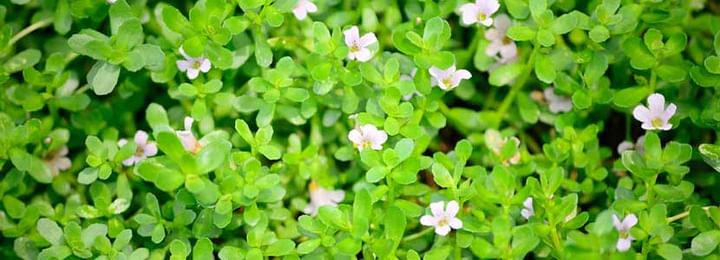Benefits of Brahmi And Its Side Effects
Last Updated: Jul 13, 2020
Brahmi has several health benefits, which are as follows; reduces blood sugars, boost immunity and power, improves skin health, serves for respiratory benefits, ideal for patients of gout and arthritis,treats insomnia and deals with mental disorder, helps in cognitive boost, treats epilepsy.
Brahmi
Brahmi is a creepy perennial non-aromatic herb. The leaves are oblong, succulent and 4-6 mm thick. Leaves are oblanceolate. The flowers are small, actinomorphic and white. It is an aquarium plant.
Nutritional Value of Brahmi
The characteristic compounds of Brahmi are; dammarane-type triterpenoin saponin with jujubogenin, alkaloids brahmine, herpestine.
Health Benefits of Brahmi
Cognitive boost and treats cognitive diseases
One of the most prized benefits of brahmi is its ability to stimulate the mind, particularly in terms of memory and concentration. It has long been used in Ayurvedic medicine to increase focus and increase retention.
Some of the organic compounds in brahmi stimulate cognitive pathways in the brain to boost cognitive ability. It has the ability to reduce the onset of cognitive disorders as we age, such as dementia and Alzheimer’s disease.
Research has shown that the presence of amyloid compound in neurons is responsible for brain damage. The bio-chemical bacosides compound in Brahmi effectively stimulates the creation of new neural pathways and lowers oxidative stress in the brain, which keeps our minds sharp well into our old age.
Respiratory benefits
When brahmi is brewed in a tea or chewed as normal leaves, it can seriously boost your respiratory health. It has been used in Ayurvedic treatments for bronchitis, congestion, chest colds, and blocked sinuses. It can clear out excess phlegm and mucus and relieve the inflammation in the throat and respiratory tracts to provide you with rapid relief.
Boost immunity
When consumed in any form, tea, leaves, or otherwise, brahmi can boost up the immune system. The small amount of nutrients is supplemented by the antioxidant compounds to increase the response time of our immune system against pathogens, viruses, or bacterial infection.
Treats epilepsy
The leaves of brahmi have been used as a treatment against epilepsy for thousands of years. This is thought to be due to the effect brahmi has on neural pathways, and it helps to prevent epileptic fits, as well as other forms of mental disease, including bipolar disorder and neuralgia.
Improves skin immunity
Spreading brahmi juice or oil on the affected area , speeds up wound healing and disinfect the skin. It can reduce the appearance of scarring and leave you with smooth, healthy skin enriched with its natural essential oils.
Reduces blood sugar
Ideal for patients of gout and arthritis
Brahmi can be a great remedy that provides relief from arthritis, gout and other inflammatory conditions. It also helps in soothing gastric ulcers and treating an irritable bowel syndrome.
Treats imsomnia and deals with mental disorders
Massaging the scalp with Brahmi oil helps to overcome sleep disorder, which in turn cures depression, anxiety, tension and stress. It is recommended that a person suffering from such negative domains of health should massage his head every night with this oil. It is helpful with hyperactive children too.
Brahmi oil has refreshing effects on mind, used as mental tonic that helps in focused concentration, increasing memory power, mental alertness, amnesia and Alzheimer’s. In fact, Brahmi has nitric oxide, which has positive impacts on the brain functioning and mental clarity.
Uses of Brahmi
Brahmi is used in pharmaceutical labs to make tablets, and powder and oil. brahmi is also used to make salads. brahmi leaves are also used for cooking several dishes.
Side-Effects & Allergies of Brahmi
Overdose of Brahmi may lead to dry mouth, headache, dizziness, drowsiness, palpitation, and nausea.
Cultivation of Brahmi
Brahmi is native to wetlands of Eastern and Western India, Australia, Europe, Africa, Asia and Northern and Southern America. Brahmi is well grown in warm and humid tropical to sub-tropical climates in damp and marshy areas. The plant prefers acidic soil with a temperature range of 30°C-40°C and relative humidity of 60% - 65%.
References
- Aguiar S, Borowski T. Neuropharmacological review of the nootropic herb Bacopa monnieri. Rejuvenation research. 2013 Aug 1;16(4):313-26. [Cited 26 June 2019]. Available from:
- GK S, MS Bharath M. Exploring the role of “Brahmi”(Bacopa monnieri and Centella asiatica) in brain function and therapy. Recent patents on endocrine, metabolic & immune drug discovery. 2011 Jan 1;5(1):33-49. [Cited 26 June 2019]. Available from:
- Gohil KJ, Patel JA. A review on Bacopa monniera: current research and future prospects. International Journal of Green Pharmacy (IJGP). 2010;4(1). [Cited 26 June 2019]. Available from:
Table of content
Ask a free question
Get FREE multiple opinions from Doctors



